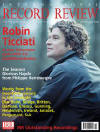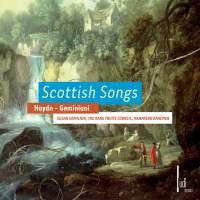Texte paru dans: / Appeared in:
*

International Record Review - (10//2014)
Pour
s'abonner / Subscription information
Ludi Musici
LM006

Code-barres / Barcode
: 8640131810066
Consultez toutes les évaluations recensées pour ce cd
~~~~ Reach all the evaluations located for this CD

We all have our pet hates when
it comes to the abuse of language. Mine is the appalling misuse of the word
'song'. A whole generation brought up to regard music as an electronic
accessory believe that the words 'music' and 'song' are synonymous. It has,
horror of horrors, spread beyond the ubiquitous song‑lists on Smartphones
and i‑whatevers, and I have given up screaming in frustration as an eager
young pianist turns to me to tell me, in all blissful ignorance, that the
next 'song' he is to play will be Beethoven's 'Moonlight' Sonata. But I
still wake up in the middle of the night sweating at the memory of the
cloying mid‑Pacific drawl of a Singapore radio announcer who told his
mercifully minuscule listening audience that it was about to hear a 'great
song called Vivaldi's Seasons'. Among the magical properties of this
sumptuously packaged, beautifully recorded and divinely performed disc is
its ability to put the word 'song' into its proper perspective. While I
still seethe to hear matchless masterpieces of the orchestral repertoire
reduced to the stature of 'song', I seethe inwardly and quietly,
understanding now that the word, like so much else in the English language,
is in a state of continual transition and holds its meaning no more
permanently than a coloratura soprano holds her top E.
Songs, as defined in
the early eighteenth century when many of those included in this disc first
appeared in print, were essentially literary, a song being the words alone
while the melodies which came to be associated with them took on the more
nebulous term 'Airs'. Great Scots writers, Allan Ramsay and Robert Burns
among the most notable, published hundreds of such songs in which, as Marc
Vignal points out in his excellent booklet notes which accompany this CD
(although, more fairly, we should describe this as a lavishly illustrated
and presented hard‑cover book with a CD insert), 'the use of music was
implied' rather than specifically included. Burns found traditional airs to
suit his words (and vice versa), but it was through the enthusiasm and
dedication of three Scottish publishers, William Napier, George Thomson and
William Whyte, that these airs started to get the serious treatment from
significant composers and came, in effect, to make the music at the very
least the equal of the words. Thomson was certainly the most committed,
devoting over half a century to publishing Scottish songs with distinguished
musical accompaniments, and among those he persuaded to arrange music for
his six hundred or so songs were Pleyel, Koeluch, Beethoven, Weber and
Hummel. His preferred arranger ‑ he described him as his 'first love' ‑ was,
however, Haydn.
On this disc we have 11 of Haydn's Scottish Folk Songs, eight taken from Napier's collections and the remainder from those of Whyte and Thomson. 'Mary's Dream' we hear in two versions, one with just violin and keyboard accompaniment (from the Napier collections) and the other with , an added cello and an extended prelude and postlude from the third of Thomson's volumes. While it is clear that Haydn elevated these relatively humble airs into elegant and at times inspired musical miniatures, what impresses most here is Susan Hamilton's deliciously naive and innocent vocal delivery. Her words are beautifully clear, her ability to blend in with the accompaniments (listen to how subtly she opens the first of the 'Mary's Dream' settings) utterly captivating, and her gentle, almost loving vocal inflections perfectly tailored to the texts. These songs are, as we read in the booklet (did I mention the pages of tartan and the painstakingly sourced illustrations?), deeply ingrained within her heritage: 'these are the songs that lulled her to sleep in her cot, the ones she has heard and sung since she was a girl'. That much is obvious; these are performances which do not just express the music, they live it with a natural instinctiveness.
In keeping with modern connotations of the word 'song', the CD also comprises several tracks which are purely instrumental. These, taken from Geminiani's Treatise of Good Taste in the Art of Musick (could we use that as a subtitle for IRRR), published in London in 1749 with a dedication to his Royal Highness Frederick, Prince of Wales, make use of several Scottish Airs to show how, with a bit of good taste, they can be turned into Music Fit For A Prince. Certainly, tenderly and lovingly nurtured by Manfredo Kraemer, The Rare Fruits Council turns out some enticingly graceful performances, occasionally admitting just the merest whiff of the windblown machair or heather‑encrusted loch side (as with the evocative flute which adds such a haunting quality to 'Lady Ann Bothwell's Lament') to give the whole thing a slightly exotic feel.
So lovely is this music, so elegant the performances and so immaculately presented to the public, that it does not just calm the savage breast, but placates even the most ardent opponent of abused four‑letter words.
Cliquez l'un ou l'autre
bouton pour découvrir bien d'autres critiques de CD
Click either button for many other reviews


